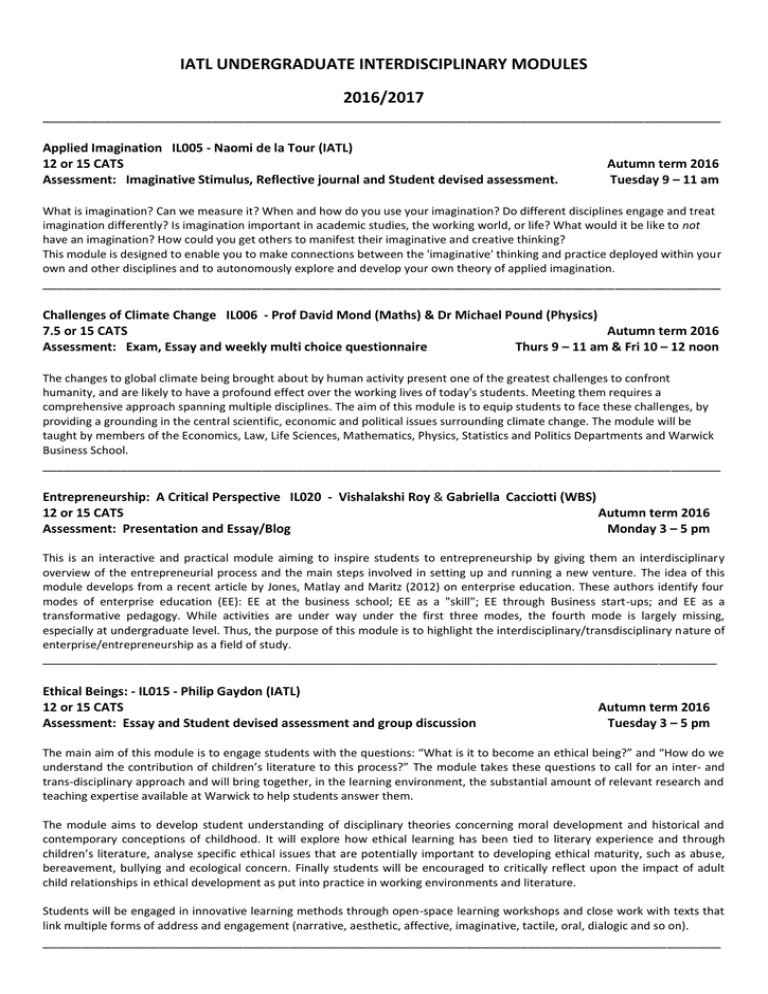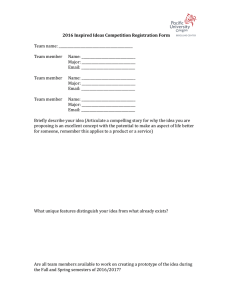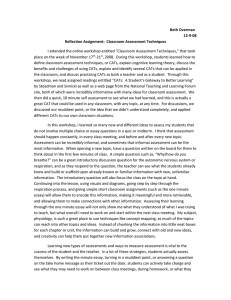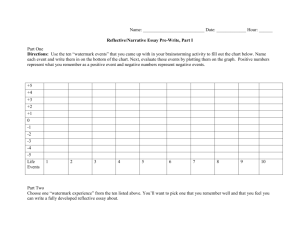IATL UNDERGRADUATE INTERDISCIPLINARY MODULES 2016/2017 ________________________________________________________________________________________
advertisement

IATL UNDERGRADUATE INTERDISCIPLINARY MODULES 2016/2017 ________________________________________________________________________________________ Applied Imagination IL005 - Naomi de la Tour (IATL) 12 or 15 CATS Assessment: Imaginative Stimulus, Reflective journal and Student devised assessment. Autumn term 2016 Tuesday 9 – 11 am What is imagination? Can we measure it? When and how do you use your imagination? Do different disciplines engage and treat imagination differently? Is imagination important in academic studies, the working world, or life? What would it be like to not have an imagination? How could you get others to manifest their imaginative and creative thinking? This module is designed to enable you to make connections between the 'imaginative' thinking and practice deployed within your own and other disciplines and to autonomously explore and develop your own theory of applied imagination. ________________________________________________________________________________________________ Challenges of Climate Change IL006 - Prof David Mond (Maths) & Dr Michael Pound (Physics) 7.5 or 15 CATS Autumn term 2016 Assessment: Exam, Essay and weekly multi choice questionnaire Thurs 9 – 11 am & Fri 10 – 12 noon The changes to global climate being brought about by human activity present one of the greatest challenges to confront humanity, and are likely to have a profound effect over the working lives of today's students. Meeting them requires a comprehensive approach spanning multiple disciplines. The aim of this module is to equip students to face these challenges, by providing a grounding in the central scientific, economic and political issues surrounding climate change. The module will be taught by members of the Economics, Law, Life Sciences, Mathematics, Physics, Statistics and Politics Departments and Warwick Business School. ________________________________________________________________________________________________ Entrepreneurship: A Critical Perspective IL020 - Vishalakshi Roy & Gabriella Cacciotti (WBS) 12 or 15 CATS Autumn term 2016 Assessment: Presentation and Essay/Blog Monday 3 – 5 pm This is an interactive and practical module aiming to inspire students to entrepreneurship by giving them an interdisciplinary overview of the entrepreneurial process and the main steps involved in setting up and running a new venture. The idea of this module develops from a recent article by Jones, Matlay and Maritz (2012) on enterprise education. These authors identify four modes of enterprise education (EE): EE at the business school; EE as a "skill"; EE through Business start-ups; and EE as a transformative pedagogy. While activities are under way under the first three modes, the fourth mode is largely missing, especially at undergraduate level. Thus, the purpose of this module is to highlight the interdisciplinary/transdisciplinary nature of enterprise/entrepreneurship as a field of study. _________________________________________________________________________________________________________ Ethical Beings: - IL015 - Philip Gaydon (IATL) 12 or 15 CATS Assessment: Essay and Student devised assessment and group discussion Autumn term 2016 Tuesday 3 – 5 pm The main aim of this module is to engage students with the questions: “What is it to become an ethical being?” and “How do we understand the contribution of children’s literature to this process?” The module takes these questions to call for an inter- and trans-disciplinary approach and will bring together, in the learning environment, the substantial amount of relevant research and teaching expertise available at Warwick to help students answer them. The module aims to develop student understanding of disciplinary theories concerning moral development and historical and contemporary conceptions of childhood. It will explore how ethical learning has been tied to literary experience and through children’s literature, analyse specific ethical issues that are potentially important to developing ethical maturity, such as abuse, bereavement, bullying and ecological concern. Finally students will be encouraged to critically reflect upon the impact of adult child relationships in ethical development as put into practice in working environments and literature. Students will be engaged in innovative learning methods through open-space learning workshops and close work with texts that link multiple forms of address and engagement (narrative, aesthetic, affective, imaginative, tactile, oral, dialogic and so on). ________________________________________________________________________________________ Reinventing Education IL008 – Dr Will Curtis (CLL) 12 or 15 CATS Assessment: Essay or Exam and Educational Dystopia/Utopia Autumn term 2016 Tuesday 11 – 1 pm The module begins from the perspective that current educational structures and practices were designed for late 19th/early 20th century requirements – and that the current system is no longer appropriate for twenty-first century ways of living. Transformations in society, culture, economy, politics, employment and knowledge require us to fundamentally rethink how we perceive and organise education. Building on existing interdisciplinary literature, the module challenges existing modes of delivery and content and explores alternative educational approaches. Through a range of activities and discussions, it encourages students to reflect critically on their own educational experiences. Students are asked to design and justify new educational models that provide a better fit with our contemporary ways of living. ________________________________________________________________________________________________ Achieving Sustainability IL012 – Prof John Pickering (Psychology) and Prof Sam Adelman (Law) 12 or 15 CATS Spring term 2017 Assessment: Exam and Essay Wednesday 11 – 1 pm This module aims to present the issue of sustainability from a variety of perspectives. Sustainability is not merely an academic topic. It is about urgent matters that require personal and political decisions to be made. Such decisions concern how we live now and what choices we make during our working lives. This is why module presenters will be not only be academics with expertise in the natural, applied and social sciences and humanities but also people with direct engagement with sustainability issues in estates, in careers and from outside the university. The module looks to encourage students to develop their own critique of sustainability, since the term is used, and over-used, in so many ways. We aim to make students aware of work outside their own subjects which may be relevant to what they study in their own degrees. The module will facilitate conversations between students and teachers who might not normally meet each other and to encourage innovative ways of teaching learning and of demonstrating that something significant has been learned. __________________________________________________________________________________________________________ Censorship and Society IL018 - Roxanne Bibizadeh (English) 12 or 15 CATS Assessment: Presentation and Reflective Essay Spring term 2017 Tuesday 3 – 5 pm Obscene, violent, shocking, explicit, sexually perverse - these are just some of the charges faced by the uncompromising writers we will be studying on this course. Does literature have the power to change the world? According to Oscar Wilde “More than half of modern culture depends on what one shouldn’t read”. This course will explore how we can redefine values, challenge entrenched ideologies, and inspire political movements. We will read an exciting range of literature from different disciplines, countries and time periods, by authors from diverse backgrounds and cultures, writing in various forms. ________________________________________________________________________________________________ Community Engagement: Theory into Practice IL017 - Mark Hinton (CLL) 12 or 15 CATS Assessment: Presentation and Reflective Essay Spring term 2017 Friday 12 – 2 pm This module offers a very different experience from other university courses. Whilst having the chance to investigate and reflect on your own aspirations and values, you will also complete 30 to 40 hours of volunteering in a local not-for-profit organisation. The module will combine theoretical understandings from your home discipline with new interdisciplinary perspectives, and apply them to practical, real world problems in communities outside the university – it will encourage you to reflect on and enhance your practical experience in a community setting, while exploring the links between academic study and community engagement within a framework of respect and reciprocity. You will test the relationship between theory and practice, reflecting collectively and individually on the emergent learning that results. ________________________________________________________________________________________ Global Connections IL014 – Naomi de la Tour (IATL) & Dr Sarah McDonald (Monash University) 12 or 15 CATS Spring term 2017 Assessment: Essay and Reflective Journal 8 -10 am – Weeks TBC This module is shared with Warwick's partner university, Monash, in Melbourne Australia. It will be taught using state-of-the-art teleconferencing equipment to students in both locations. The module examines questions of cultural literacy through a variety of approaches from different disciplines. A rich and pluralistic appreciation of the challenges of understanding and acquiring cultural literacy will be relevant to all Warwick graduates in their personal and professional lives. The module is designed via interdisciplinary study to enable student to make connections between their own discipline/s and the object of study, and so devise original research questions. ________________________________________________________________________________________ The Science of Music IL016 – Dr Gavin Bell (Physics) 7.5, 12 or 15 CATS Assessment: Exam or Project and weekly multi choice questions Spring term 2017 Friday 10 – 12 pm This interdisciplinary module aims to introduce students (in all subject areas and with any level of musical expertise) to the relationships between science, music and mathematics. Students will develop an appreciation and understanding of the complex interplay of mathematics and physics with technological, cultural and historical factors inherent in the making and appreciation of music. The course will also touch on aspects of physiology and psychology in the perception of music and the inspiration of mathematical and scientific ideas in musical composition and will include input from external speakers and the Coull Quartet. NEW INTERDISCIPLINARY MODULES FOR 2016/2017 ________________________________________________________________________________________ Local and Global Shakespeares – Dr Paul Prescott (English) & Dr Fiona Gregory (Monash University)) 12 or 15 CATS Autumn term 2016 Assessment: Creative project, Reflective essay & Presentation Tues & Thurs 8-10 am (Weeks 1,2,3,5,& 6) This intensive module provides students with the opportunity to examine Shakespearean texts and productions in both local and 'global' contexts. Students at Monash will work simultaneously with students at Warwick to share particular knowledges and deepen their understanding of local, regional, national and transnational approaches to the texts. They will interrogate the extent to which Shakespeare – the ‘global playwright’ in the words of the 2012 World Shakespeare Festival – can be indigenized and used as a platform for local community identity and as a tool to explore contemporary issues of politics, race, class, gender and culture. An informed critique of the work of ‘local’ Shakespeare companies will be followed by the students themselves devising creative responses to Shakespearean texts. Research will inform practice, and that practice will in turn produce original creativecritical work and analytical reflection on the module’s key themes. ________________________________________________________________________________________________ Sport, Philosophy and Practice – Philip Gaydon (Philosophy) and Dr Jonathan Heron (IATL) 12 or 15 CATS Assessment: Essay, Student devised activity & Reflective blog/journal Autumn term 2016 Wednesday 9 – 11am Sport has profound connections with our physical, social, and psychological lives. It perforates our everyday experiences whether we participate in it or not. But what precisely do we understand as 'sport' and what constitutes a sporting environment? What is the distinctive value and nature of sport in human experience? How do ethics, aesthetics, and a search for knowledge about ourselves and the world factor into our sporting endeavours? And where does sport as an extra-curricular activity meet established curricula? These are some of the questions this module will invite you to explore. In addressing them you will encounter theories from a variety of disciplines, have the chance to analyse film, literature, and your own sporting practice, and engage in practical field work and active learning. ________________________________________________________________________________________________ Genetics: Science and Society – Dr Elena Riva (IATL) 12 or 15 CATS Assessment: Essay and Student devised assessment Spring term 2017 Tuesday 2 – 5 pm What is genetics? What are gene therapy, genome editing and neuroimaging genetics? How have advances in genetics affected society? What are the ethical implications of the genetic selection? Does genetics influence popular culture and vice versa? This module will help you to explore all these questions and to look at a global topic such as genetics in its complexity, discovering the potential of an interdisciplinary approach to the matter. It will give you an overview of the last human genetic technologies and it will focus on the interactions between science, technology, society, politics and culture in particular on the issues of the ownership of genetic information, the ethical controversies around the use of genetic selection and reprogenetics, the correlations between genetics and ethnicity and the relationship between science fiction movies and biotechnologies. You will be directly involved at every stage of the learning process and at the centre of team and problem based learning activities throughout the module. Laughter: A Transdisciplinary Approach – Dr Nicholas Monk (IATL) 12 or 15 CATS Assessment: Marking exercise, Reflective Journal, Forum moderation Spring term 2017 Monday 10 – 12 pm Laughter is one of the most frequent and important manifestations of emotion and affect in social interaction, yet it tends to be ignored in the growing field of the study of emotion. What makes us laugh? What happens when we laugh? Why we laugh? indeed, what is laughter? All these questions and more will be the subject of this module. We will examine the phenomenon of laughter from a wide variety of disciplinary perspectives including neuroscience, physiology, sociology, philosophy, film and television, and literary studies. The Orange prize winning writer, and stand-up comedian, A.L. Kennedy, will also contribute. Students will be expected to bring examples of what makes them laugh to each session, and complete a reflective journal on the experience of the module. For further information on IATL and for details of our other 2016/17 interdisciplinary modules please view our website http://www2.warwick.ac.uk/fac/cross_fac/iatl/activities/modules/ IATL, First floor, Senate House Email: iatl.modules@warwick.ac.uk



